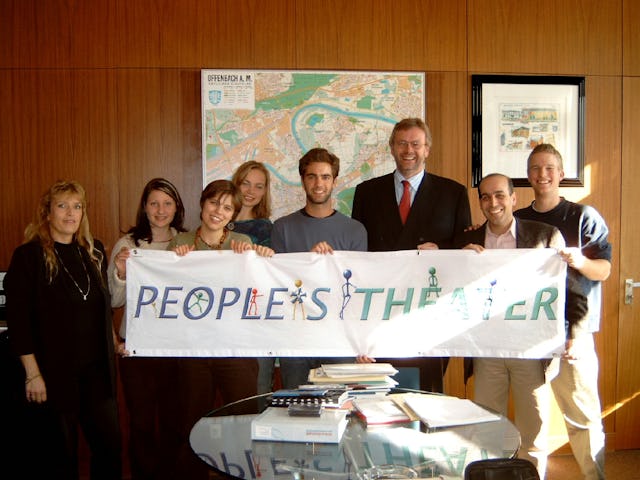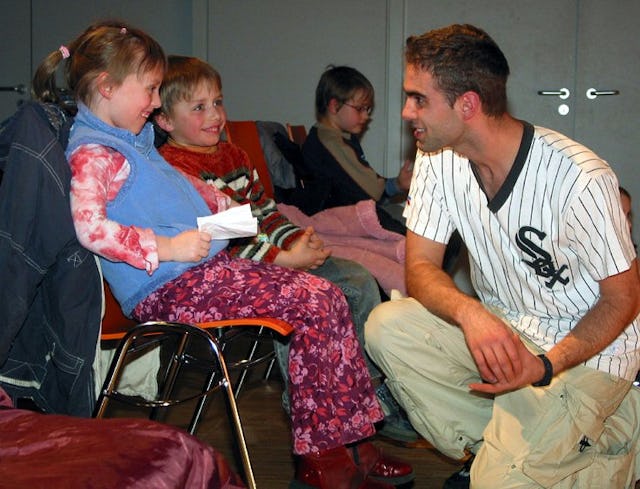People's Theater begins new season
OFFENBACH, Germany — An award-winning Baha'i-inspired theater project began a new season of performances this week aimed at preventing violence and promoting social skills among school students.
Earlier, representatives of People's Theater outlined the program to the mayor of Offenbach, Gerhard Grandke, who has been a strong supporter of the project.
As well as being well known and appreciated in this city, People's Theater has won favor this year at the highest levels of the federal government.
The German Minister for Family and Youth, Renate Schmidt, awarded two representatives of People's Theater, Curtis Volk and Erfan Enayati, a financial grant to assist the further development of the theater.
People's Theater was one of 25 winners selected from 560 entrants in a competition initiated by the Office of the Chancellor to select the projects with the most promise of benefiting society.
At a reception for award recipients in July 2004, the German Chancellor, Gerhard Schroeder said to the winners: "We need more people like you, people who know how to transfer their knowledge and talents into service for the community."
People's Theater was founded by Erfan Enayati, a Baha'i from Offenbach, who was inspired by "The Happy Hippo Show," a television program in Russia created by Shamil Fattakhov to help youth deal with moral and ethical situations in their everyday lives.
The Baha'i inspiration behind the People's Theater is seen not only in its selection of the social topics that are the themes of its performances, but also because in its guiding principles such as honesty and sincerity, and the decision-making process used on a daily basis by those involved in the project.
Called consultation, this method is used by Baha'is to dispassionately examine different points of view before coming to a consensus.
In addition, the Baha'i principles of the underlying unity of world religions and respect for all ethnic groups play a fundamental role in every show.
Presentations by the People's Theater combine the elements of a talk show with those of a theater. A twist is that its outcome is largely influenced by the audience. (See an article about "The Happy Hippo Show" http://www.onecountry.org/e103/e10304as.htm.)
Each show illustrates a conflict that exists in the school where the show is being performed.
The theater portion of the show portrays the problem to the audience. Then, in the talk show section that follows, the audience discusses constructive solutions to the problem through dialog, discussion, and role-play.
The moderator begins the show by explaining the rules. The actors then illustrate a conflict in a scene that focuses on such issues as violence, backbiting, and dishonesty.
The moderator stops the scene and asks the audience such questions as: "What just happened?", or "How do the actors feel?", or "What could be done to change the situation?"
After a discussion by audience members, the moderator chooses a student to replace one of the actors. The student is then encouraged to try to change the situation by using ideas from his or her peers.
The scene lasts up to about five minutes and then begins again. After several attempts by the audience, the scene is then repeated one last time by the initial actors who follow the advice of the audience. The moderator then sums up.
The first performance of People's Theater was at a primary school in 2001 with the support of the Mayor of Offenbach, Gerhard Grandke.
"I was convinced and excited about the prospects of this project and its underlying concept from the beginning so I gladly sponsored it," Mr. Grandke said.
The project also has the support of local government offices dealing with education, community integration and crime prevention, and it has received a warm reception in the public school system.
During the last two years the People's Theater has performed more than 700 shows in more than 40 schools. In the past school year, five youth dedicated their time to working in the theater as a social service, and now more youth have offered to follow them for a year of service.
Participation in the People's Theater is recognized as social and civil service, and as such, it may be substituted for the mandatory military service required in Germany. It is supported by a pedagogical association and has a board of trustees.
A principal at Gutenberg Primary School, one of the schools where People's Theater has performed, Heike Burger, said that working with People's Theater was an enjoyable experience.
"The program was praised by all participants; parents, teachers, and pupils," Ms. Burger said.
A teacher at the Adolf-Reichwein High School, Elke Kunkel, said that the children were inspired to think by the themes of the show and were motivated to search for positive solutions."
"The young actors and actresses have a special understanding of the language which speaks to the youth --they are able to get their attention and motivate them to work with the show," Ms. Kunkel said.
"The work with the young actors and actresses is a worthwhile investment in our pupils," she said.
A teacher at the Helen-Keller Primary School, Christina Kutzmann, said that working with People's Theater is very constructive for the pupils.
"They are able to work with abstract ideas, for example 'Conflicts from Boredom' or 'Dealing with Provocation' in a very creative fashion that realistically brings the problems (to the attention of) the children in an appealing manner."
Report by Jennifer Wiebers.
For more about People's Theater see http://www.peoples-theater.de/.

